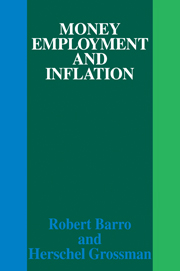Book contents
- Frontmatter
- Contents
- Dedication
- Preface
- Introduction
- 1 The basic model
- 2 Output and employment under non-market-clearing conditions
- 3 Capital, financial assets, and the rate of return
- 4 Inflation and rates of return
- 5 Inflation and unemployment
- 6 The dynamics of aggregate demand
- 7 Output and employment with wage and price speculation
- References
- Index of names
7 - Output and employment with wage and price speculation
Published online by Cambridge University Press: 07 October 2011
- Frontmatter
- Contents
- Dedication
- Preface
- Introduction
- 1 The basic model
- 2 Output and employment under non-market-clearing conditions
- 3 Capital, financial assets, and the rate of return
- 4 Inflation and rates of return
- 5 Inflation and unemployment
- 6 The dynamics of aggregate demand
- 7 Output and employment with wage and price speculation
- References
- Index of names
Summary
This chapter considers the possibility that economic units have incomplete information regarding the spatial dispersion of wages and prices. Section 7.1 sketches an analytical framework, which produces such a spatial dispersion. Section 7.2 analyzes how incomplete information about this dispersion on the part of households generates speculative behavior in the determination of labor supply and consumption demand. Section 7.3 analyzes how such speculative household behavior affects the determination of output and employment. Section 7.4 considers speculative behavior on the part of firms.
The framework of wage and price speculation
In the basic model of chapter 1, changes in aggregate demand produced, say, by a change in the nominal money stock have no effect on either output, employment, the real wage rate, or the real values of other endogenous variables. This conclusion required two important assumptions. One of these assumptions was that exchange took place only under general-market-clearing conditions. The analysis in chapter 2 revealed how output and employment do depend on aggregate demand if exchange takes place when either wages or prices are not equal to their general-market-clearing values. The second important assumption of the basic model, which we have maintained until now, was that all economic units correctly perceive, pay, and receive the same wage rates and output prices. The purpose of the present chapter is to examine the implications of relaxing this second assumption. Specifically, we now assume that economic units have incomplete information regarding the relevant alternatives – that is, the wages and prices – which they face.
- Type
- Chapter
- Information
- Money Employment and Inflation , pp. 238 - 258Publisher: Cambridge University PressPrint publication year: 1976



